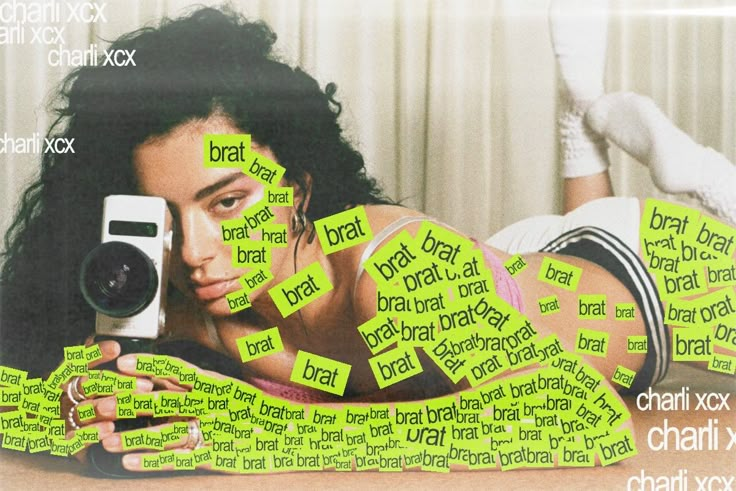You know those memes that are like “Me dancing to ‘I think about it all the time’ thinking it was ‘Von dutch’”? That’s Brat. Charli XCX was finally gifted her flowers in mid-2024 with her release of album Brat, widely praised as Charli’s most confident and experimental work yet. The album stands out for rejecting the polished, overproduced feel of mainstream pop, instead embracing raw, glitchy hyperpop textures and blunt, chaotic lyrics. To me, Charli’s aim with Brat is both a critique and a celebration of pop itself, making music that is fun and upbeat but also with her own edge that it unconventional and exploratory. Brat performs a kind of self-aware hedonism – it glorifies excess, partying, ego, and self-indulgence, but does so with irony and emotional honesty. The album blurs the line between sincere confession and performance art.
Brat shifts away from the relatively glossy mainstream pop that characterised Charli’s Crash era, and leans heavily into club, rave, hyperpop and deconstructed dance textures. The album pulses with energy – tracks like ‘Von dutch’ and ‘Club classics’ carry a kind of ecstatic abandon that makes their more sensitive moments feel earned. The album’s impact goes beyond the music: the vivid lime-green, referential visuals, the merch, it was aesthetic, identity, and vibe. Charli herself has stated that the making of her album Brat, with the almost minimalistic cover of a plain neon lime-green background and the word ‘brat’, was actually a money-saving tactic. Although she had no idea of the viral sensation that was to be made of her iconic party album, the bright green colour will be remembered as hers, as it wasn’t a popular colour at all, until Charli came around. Her bold behaviour defies pop cultural norms, similar to her bright green colour. In a time where art in media all around us is repeating, movies are being remade and music is starting to consistently sound the same, Charli’s new edge has taken the world by storm, putting a wedge in cultural norms and drastically changing trends.
The ‘brat’ persona is loud, brash, confident – but Charli doesn’t stop there. She reveals grief, insecurity, comparison, longing. On songs like ‘Sympathy is a knife’, you hear the tension between bravado and self-doubt. Charli’s shocking collaboration with Lorde also adds emotional depth to this album; with the two extremely talented artists being involved in a feud created by the internet, the reconciliation truly shocked their audiences, as well as warmed their hearts: “And when we put this to bed, the internet will go crazy / I’m glad I know how you feel, ‘cause I ride for you Charli!” This gives Brat the emotional depth that Charli herself holds, in contrast to her energetic persona. However, the album’s strengths are also its challenge. There are moments when the shift between high energy and vulnerability feels jarring, even overwhelming. In saying that, Charli’s range in the Brat album from party girl over-the-top vibes to her vulnerable whirlwind of self-doubt to a grief-filled tribute is extraordinary, showing not only her talent as an artist but also her depth as a person.
Part of the critique around Brat is that its rebellion, its countercultural texture, quickly gets absorbed: neon-green merch, viral filters, ‘brat behaviour’ trends. What begins as irreverence sometimes risks becoming another product to consume. The wild texture sometimes overshadows nuance; in wanting to be messy and bratty, there are parts where less might have been more. Some suggest that the contrast between Charli’s bold beat and also her vulnerability in lyricism clashes together. There’s tension here; can a mainstream star maintain authenticity in pushing back when the very institutions she reacts against control much of music culture, production, and visuals?
Brat is, in many ways, Charli XCX at her most unapologetic. It’s imperfect, beautiful, dissonant, and thrilling. Its value lies not in being a flawless pop masterpiece but in its willingness to embrace contradiction. It’s daring, cathartic, and electric – a vivid marker of what pop could mean when an artist leans into their mess rather than smooth it over. If there’s a criticism, it’s that sometimes the persona threatens to flatten the emotional stakes, but even that tension is part of what makes Brat compelling.
This is one of those albums that feels like it will ripple outward – in fashion, in internet culture, maybe even in how pop music gets made. For now, it’s hard not to be caught up in the chaos, and I think Charli wants it that way.
